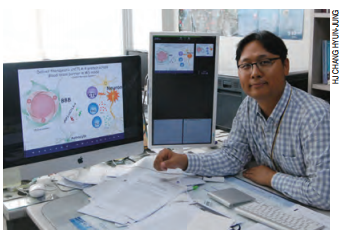
A peptide drug delivery system uses cell-permeable peptide dNP2, which efficiently delivers proteins into T cells as well as various tissues by penetrating blood-vessel barriers. The main reason why drugs were not deliverable to these tissues is the tight junction of blood-vessel barriers that limits the entrance of various elements. However, Choi discovered that dNP2, a type of peptide that originally exists in the human body with both hydrophilic and lipophilic properties, can penetrate blood-vessel barriers. By combining the peptide with certain therapeutic protein, diseases related to the brain and the central nervous system can be treated. Choi expects that this method will greatly contribute to treating diseases that previously faced limitations due to the restriction of penetration into tissue.
“Originally, surgery was considered the only solution to any diseases related to the brain. However, with the development of the peptide drug delivery system, the injection of the drug itself can make treatment possible,” Choi said. This new drug injection treatment could alleviate the uncomfortable effects of past brain surgeries. Also, since the peptide originally exists in the human body, it will have less side effects than surgery.
To optimize the peptide drug delivery system, Choi is trying to minimize the number of peptides to make the drug smaller. The peptide will eventually substitute CTLA-4, the therapeutic protein, to be more cost efficient since protein drugs require complex procedures while those for peptide drugs is simpler.
As a researcher, Choi hopes to contribute to society by helping patients overcome their diseases through his medical developments. Also, he advised Hanyangians to set clear goals in their lives and devote to a certain achievement.

